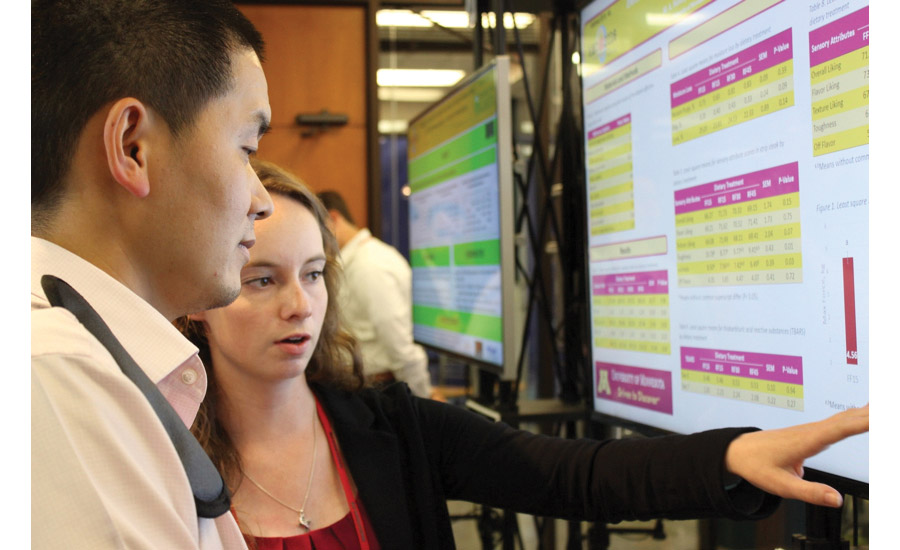Higher Education
AMSA 69th RMC: What we learned, and where we are going

The 69th annual RMC was hosted by Angelo State University in San Angelo, Texas, and was attended by students and professionals.
The first meeting of the American Meat Science Association’s annual Reciprocal Meat Conference (RMC) was an assembly of a handful of men sharing ideas. Today, RMC has grown into the largest meeting of meat scientists in the United States. This year, the 69th annual RMC was hosted by Angelo State University in San Angelo, Texas. The conference was attended by students and professionals. In a span of three days, 94 speakers presented more than 100 sessions on various topics regarding meat science and industry.
Congressman Mike Conaway, United States Congress representing Texas’11th Congressional District and the U.S. House Committee on Agriculture Chairman and Congressman David Rouzer, United States Congress representing North Carolina's 7th Congressional District and Chairman of the Subcommittee on Livestock and Foreign Agriculture opened the conference with an outstanding keynote session. This was an interactive session that allowed questions straight from the audience encouraging dialogue between the congressmen and the RMC attendees. Questions from the audiences touched on the topics of sustainability, foreign trade, research funding, and food safety. Congressmen Conaway and Rouzer gave great insight into the political side of agriculture, while allowing the public to share their concerns with the representatives.
Lynn Dornblaser, Chad Clem and Dr. Tom Rourke presented an interesting session titled “Natural and Clean Label Processed Meats: Trends in Consumer Demand, Formulation Strategies and Quality Issues.” The session focused on consumer trends and communication between companies and consumers.
Dornblaser, Director of Innovation & Insight at Mintel, a market intelligence agency, has done years of extensive research on consumers and the food industry. “Consumer perception and doubt is causing huge changes for the food industry and producers,” Dornblaser said. Consumers are becoming more attentive of what is in their food, which has caused companies to respond with fresh, new ideas of communication and labeling. More companies are focusing on simple, natural formulations as consumer trends shift.
Clem, Director of Research & Development at Applegate Farms gave further information into consumer knowledge and clean labeling. Clean labeling is the clear and understandable labeling of food that often has natural ingredients with little to no artificial colors or preservatives. He said, “consumers don’t know what clean labeling is” and buzz words cause a lot of confusion. Consumers often look at packaging and are drawn in by the exciting statements such as “Gluten Free” when the product naturally has no gluten. Clean labeling, used correctly, can offer transparency to the consumer, but when overused can be morally questioned as a means to drive price. Clem endorsed that consumers should have the right to know what is or is not in their food, but clean labeling needs to be used properly and truthfully.
Rourke, a Senior Business Development Manager at Corbion Purac, a company that specializes in food safety ingredients, rounded out the session by introducing natural compounds that can be interchanged in everyday foods to replace the more complex ingredients. The ingredients that he works with give the industry a natural alternative, while maintaining a high-quality, safe product. Rourke works to innovate the same, if not higher quality products without the ingredients that raise concerns for consumers and keep the benefits of shelf stability.
Damian Mason commenced the second day with an energetic and exciting session tiled “Agriculture: Trends, Topics and Tomorrow.” This session was a major highlight of this year’s RMC. Mason did not shy away from controversial topics, his presentation hit hard on the politics of the food industry and current events.
One of his most powerful statements was simply reminding the industry of the saying “ag needs to fight back.” The industry is constantly facing opposition from cause groups, media and sometimes administration politics.
Mason said, “when we are confronted, we take a man and his wife, farm people, put them in front of a pretty barn with their kids and say we are America’s farmers and we work hard and care about what we do.” He reminds us that consumers believe they work hard as well.
Mason uses the example of animal activist groups that would protest wearing animal hides by defacing fur coats of “rich women.” Mason asked, “did you ever see protestors go into a biker bar and deface their leather jackets?” He suggests that agriculture needs to be the bikers, not the unsuspecting women in the fur coats. Mason asked, “Why do we keep backing down playing the nice guy when confronted?” He believes that the agriculture industry has been pushed around for too long and urges them to fight back.
Mason’s powerful message about important topics in agriculture mixed with comedy kept the audience engaged and left the audience with a message that was well-received by all. His background and respect for agriculture allowed him to connect with the audience and strengthen his message.
Members attending the 2016 AMSA RMC gained amazing tips and ideas about better communication as scientists through sessions and idea sharing. Aside from the sessions, multiple events and competitions were held to encourage networking between attendees. Events included product development contests, a career fair and social events highlighting the rich traditions that San Angelo, Texas had to offer. The AMSA 69th RMC was one of the largest to date and the American Meat Science Association expects only an increase in attendance for years to come.
Looking for a reprint of this article?
From high-res PDFs to custom plaques, order your copy today!



